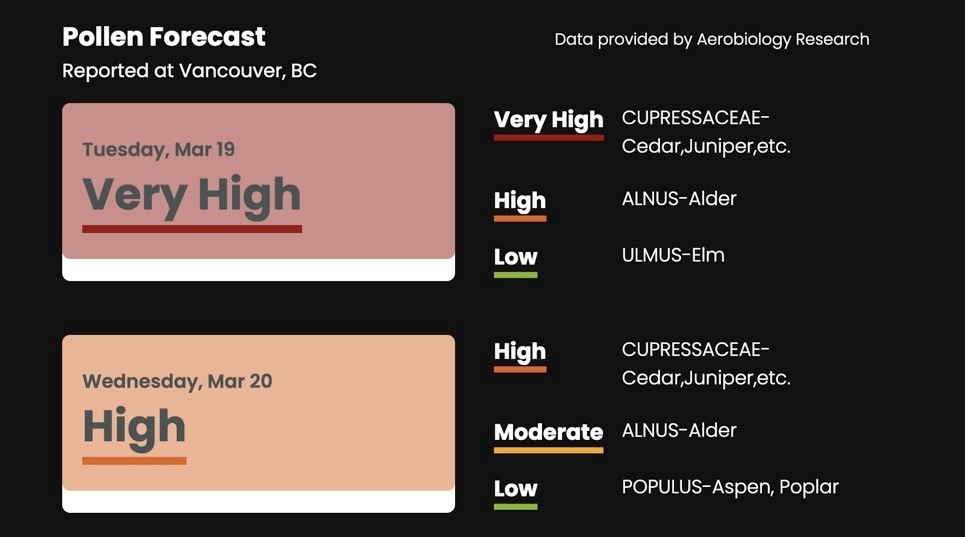Warm weather sends Metro Vancouver's early tree pollen season into overdrive
An unseasonably warm winter meant Metro Vancouver’s tree pollen season started in late January this year, which is two to four weeks early.
And four days of non-stop sunshine with some record-breaking temperatures in mid-March has sent pollen counts into overdrive.
“Now that the weather has gotten much better, we are seeing much higher pollen count, and this is of course impacting people with pollen allergies,” said Dr. Amin Kanani, UBC’s head of the Division of Allergy and Immunology, who added the biggest culprits right now are alder, birch, willow, cottonwood and oak trees.
“We are allergic to the pollens that are very easily airborne,” Kanani said. “The pollen is floating into the air, we are getting it into our noses, into our eyes, into our lungs, so we get symptoms of nasal stuffiness, congestion, drippy nose, sneezing, itchy nose, (and) itchy, tearing eyes.”
Allergy sufferer Martyna Noworyta is experiencing the mid-March misery. “I already have a very stuffy nose, itchy sore throat. I find allergies just keep coming earlier and earlier every year, so unfortunately this year it’s already happening,” she said.
Because the high pollen levels are happening at the tail end of cold and flu season, it can be difficult to know what’s causing the runny nose and sneezing.
“We can distinguish it from a cold mainly due to the duration of the symptoms, because pollen season goes for many months, and a cold lasts days or a week,” said Kanani.
For chronic allergy sufferers, the hits will keep on coming. Metro Vancouver has two allergy seasons – when tree pollen is winding down, grass pollen will be getting started in May, and that lasts through August.
“Some can be allergic to both, some are just one or the other," said Kanani. "But they present the same way."
People with mild symptoms can usually find relief with over-the-counter antihistamines and saline nasal flushes.
“For those who have more moderate to severe symptoms, we recommend the prescription nasal sprays on anti histamine eye drops,” said Kanani, who also suggests people consult an allergist to determine what they’re actually allergic to.
Noworyta has prescription medications, but is still suffering from the abnormally high pollen counts.
“Honestly I’ve sneezed like 50 times today,” she said. “Essentially for the time being, I have to take my medication, my nasal spray, my eye drops, and hope for the best.”
 (Source: The Weather Network)
(Source: The Weather Network)
CTVNews.ca Top Stories

Invasive and toxic hammerhead worms make themselves at home in Ontario
Ontario is now home to an invasive and toxic worm species that can grow up to three feet long and can be dangerous to small animals and pets.
Opinion I just don't get Taylor Swift
It's one thing to say you like Taylor Swift and her music, but don't blame CNN's AJ Willingham's when she says she just 'doesn't get' the global phenomenon.
An emergency slide falls off a Delta Air Lines plane, forcing pilots to return to JFK in New York
An emergency slide fell off a Delta Air Lines jetliner shortly after takeoff Friday from New York, and pilots who felt a vibration in the plane circled back to land safely at JFK Airport.
Britney Spears settles long-running legal dispute with estranged father, finally bringing ultimate end to conservatorship
Britney Spears has reached a settlement with her estranged father more than two years after the court-ordered termination of a conservatorship that had given him control of her life, their attorneys said.
Last letters of pioneering climber who died on Everest reveal dark side of mountaineering
George Mallory is renowned for being one of the first British mountaineers to attempt to scale the dizzying heights of Mount Everest during the 1920s. Nearly a century later, newly digitized letters shed light on Mallory’s hopes and fears about ascending Everest.
opinion RFK Jr.'s presidential candidacy and its potential threat to Biden and Trump
Although it's still unclear how much damage Robert F. Kennedy Jr.'s candidacy can do to either Joe Biden or Donald Trump this election, Washington political columnist Eric Ham says what is clear is both sides recognize the potential threat.
Haida elder suing Catholic Church and priest, hopes for 'healing and reconciliation'
The lawyer for a residential school survivor leading a proposed class-action defamation lawsuit against the Catholic Church over residential schools says the court action is a last resort.
It's 30 years since apartheid ended. South Africa's celebrations are set against growing discontent
South Africa marked 30 years since the end of apartheid and the birth of its democracy with a ceremony in the capital Saturday that included a 21-gun salute and the waving of the nation's multicolored flag.
From pop to politics, what to know as Sweden prepares for the 2024 Eurovision Song Contest
Taking place in May in Malmo, Sweden, the 68th annual competition will see acts from 37 countries vie for the continent’s pop crown in a feelgood extravaganza that strives — not always successfully – to banish international strife and division. And you don’t have to be in Europe to watch, or to help pick the winner.






























